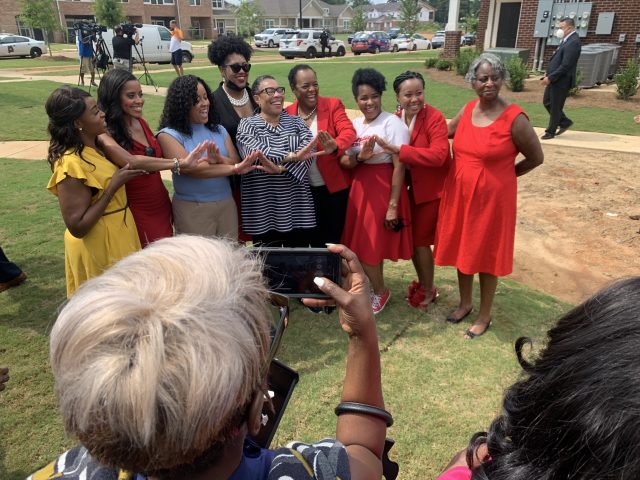By Ryan Michaels
The Birmingham Times
Marcia L. Fudge, U.S. Secretary of Housing and Urban Development (HUD) joined U.S. Rep. Terri Sewell and Birmingham leaders Wednesday at an under-construction apartment complex in Titusville to tout President Joe Biden’s Build Back Better agenda, while praising economic development in the city.
The Build Back Better agenda is focused on housing, jobs and providing economic opportunities for large and small businesses which are part of a recently passed $1 trillion dollar infrastructure bill in the U.S. Senate that has been sent to the House of Representatives.
On her way to Titusville, Fudge said that community “is a place that gives people dignity. This is a place that gives people hope . . . when I took this job [as HUD secretary] the only reason I would do it is because I wanted for people who live on the outskirts of hope to have a better life.”
Build Back Better is framed significantly around recovery from the COVID-19 pandemic which shed a light on the importance of housing, Fudge said.
“When the pandemic started, the first thing [said] was ‘stay home.’ What if you didn’t have a home? Then, ‘Don’t send your children to school. Let’s teach them from home.’ What happened if you had to drive to the McDonald’s and sit in the parking lot or sit in the parking lot of your local library because you didn’t have broadband? Then, ‘If you’re sick, stay home.’ What happens if you didn’t have health care and you were stuck in the house—or lack of one?”
Housing is an issue which particularly affects people of color, Fudge said.
“We are going to do a lot more to make sure that people of color and low-income people and moderate people can buy a home,” she said. “As people of color, we know that is the first place by which we build generational wealth is to buy a home, but we’ve made it so hard because we make it more difficult to get credit just because of what we look like.”
Mayor Randall Woodfin said the Build Back Better plan will help “build or restore” more than two million affordable homes and will help areas that have been ignored in the past.
“It will drive down costs of housing dramatically, expanding our supply of affordable housing,” Woodfin said. “On top of lowering costs, these historic housing investments are specially targeting communities of color, helping to create energy and efficient, sustainable infrastructure in historically underserved areas.”
Sewell, who represents Alabama’s seventh district, which has been hit hard by a lack of housing said her district is “tough,” with “a resilient spirit.”
“We know that we’ve had systemic disinvestments that have prevented too many of our people from reaching their full potential,” she said. “We know that issues like pollution and lack of affordable, quality housing has really set us back, but we also know what’s possible. We see it right on this site, [the Villas at Titusville].
Fudge said Biden has given her “broad latitude” to improve American livelihoods. That freedom was surprising, she said.
“I would wake up in the middle of the night and say, ‘I wonder if I can use a voucher as a down payment.’ I went to the office that day, and they said ‘you can do that’. Then, I asked them about doing away with student loan debt, they said ‘you can do that.”
Student debt, Fudge said, is something that has particularly hurt people of color and poor people.
“We are doing a lot of things that I think are going to be helpful, we’re dealing with student debt [which has] has always been a barrier for people of color. I came out of school with a lot of student debt, but who has student debt? Black people, brown people, poor people. The system has been really weighted against us, but it is my job to change it.”
The Housing Authority of the Birmingham District (HABD) president David Northern said the city is headed in the right direction for housing.
“We have some amazing challenges, but our challenges are really opportunities…we see [up to] $100 million of development going on, which will massively affect our economy,” Northern said. “With the guidance of our board members, our elected officials, the clients, the residents we have, we will have much brighter days into the future.”





